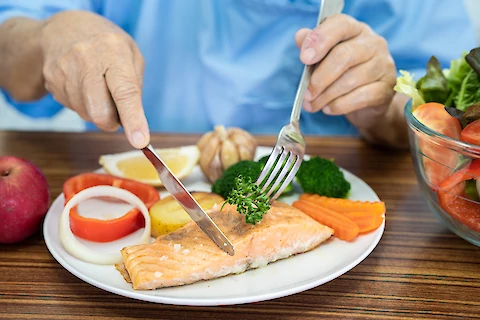
Integrating optimal nutrition into our daily diet becomes increasingly crucial as we age. One nutrient that stands out in contributing to senior health is Omega-3 fatty acids. These essential nutrients play a significant role in various bodily functions, including brain health, inflammation control, and heart health. More importantly, our bodies can't produce polyunsaturated fatty acids on their own, which means we must source them from our diets.
The Different Types of Essential Fatty Acids
Omega-3 is a collective term for a group of polyunsaturated fatty acids (PUFAs). They come in three primary forms that our bodies need for optimal health: Eicosapentaenoic acid (EPA), Docosahexaenoic acid (DHA), and Alpha-linolenic acid (ALA).
EPA and DHA are commonly found in marine sources, like fatty fish. They directly support heart, brain, and eye health. ALA, on the other hand, is derived from plant sources like seeds and nuts. It's a vital nutrient, but our bodies must convert it into EPA or DHA before use, a process that isn't very efficient.
Why Omega-3s in Senior Diet is Beneficial
Research has linked Omega-3 intake with a broad range of health benefits, including:
Brain and Heart Health
For the brain, n-3 fatty acids, specifically DHA, are essential for maintaining cognitive health, possibly slowing the progression of Alzheimer's disease, and warding off depression. In terms of cardiac wellness, these fatty acids can help lower triglyceride levels, reduce the risk of abnormal heart rhythms, and slightly lower blood pressure.
Reduces Joint Inflammation
Another benefit of PUFAs is their potential to fight joint inflammation, a common ailment among seniors, promoting better mobility and less pain. Healthy fats, particularly DHA, can help protect our eyes from age-related macular degeneration.
How to Incorporate More Healthy Fats Into Your Diet
As we’ve been reiterating, having more n-3 fatty acids is essential for better health. So, how can essential fatty acids be incorporated into daily meal plans? Here are some practical sources:
Fish
Consuming fatty fish, such as salmon, mackerel, and tuna, is the most direct route to incorporate essential fatty acids. Try integrating fish into your menu at least two times a week.
Nuts and Seeds
Chia seeds and flaxseeds are great options when it comes to plant-based sources. Add them to your morning oatmeal, or sprinkle some into a smoothie. If you're a fan of nuts, walnuts are one of the top nut sources for ALAs. These can be enjoyed as a snack or added to salads for a healthy crunch.
Soybeans
Soybeans and products derived from them, such as tofu and tempeh, are also rich in ALA. Include these Omega-3s in your senior diet by adding them to stir-fries or soups for a boost of plant-based protein. Hemp seeds are another source you can use in similar ways as chia and flaxseeds.
Senior Helpers Hattiesburg Can Help Seniors With Healthy Meal Planning
Omega-3s are a critical component of a healthy senior diet, especially for those who require a potent line of defense against cognitive decline, coronary disease, joint inflammation, and eye issues. While we've provided a general guide, always consult with a healthcare provider for personalized advice.
If you're a senior living in Laurel, Waynesboro, Collins, Poplarville, or Hattiesburg, Senior Helpers Hattiesburg is here to support you. We offer a range of services tailored to seniors, helping you maintain independence and quality of life. Reach out to us to learn more.